PROPERTY PROFESSIONAL


SELLING SUMMER


DO SEASONS MATTER?


MEET LISA KEARNEY, OUR NEW PRESIDENT

AI & YOU ARE YOU USING IT?













DO SEASONS MATTER?


MEET LISA KEARNEY, OUR NEW PRESIDENT

AI & YOU ARE YOU USING IT?











Welcome to the summer edition of Property Professional. The now perennial problem of a lack of supply of properties to buy and rent continues to dominate the market, keeping prices elevated. Those who wish to sell are holding back amid a fear of not being able to find suitable alternatives, or exposing themselves to the risk of getting caught with prices rising before securing a suitable property. In the capital the supply issue is so acute that Dublin Chamber of Commerce in its recent Business Outlook survey found almost two-thirds of companies have lost sta or potential recruits because of the city’s housing situation. Almost a third, 30%, said they had to provide accommodation supports themselves. But it’s not only an issue for Dublin, similar pressures exist elsewhere too. As the Budget debate gets underway and political parties of all hues and none compete for the support of the public in the forthcoming general election, with much speculation that it could happen as early as October, we need to see market reality enter the discussions. We need more insight, based on data, and less of the polarised media and Dáil exchanges that demonise landlords and other property investors. We need them more than ever but we’re losing them and the potential consequences are not pretty. On interest rates, the European Central Bank delivered a 0.25% cut in June and perhaps more before year end, the entry of Spain’s Bankinter to the Irish market where it already operates under the Avant Money name, marks a very welcome competition boost to the market. In April the Legal Services Regulatory Authority (LSRA) finally published its long awaited report and recommendations on conveyancing to the Minister for Justice. It contained many of the previously stated positions and reasons why digitalisation and the new profession of conveyancer should be delayed. However, in response to the LSRA report the Competition and Consumer Protection Commission, in a statement, expressed disappointment and called for: “an end to solicitors’ monopoly on conveyancing services” with a clear timeline for the introduction of a new profession of conveyancer, which it said would “drive competition and bring benefits to consumers, such as a faster service and lower fees.” Later in this edition Brian McHugh, Chair of the CCPC, sets out the position of the State’s watchdog on the issue and calls on the Government to publish a timeline for both digitisation and the introduction of a profession of conveyancer. Indeed you can also read about the conference IPAV recently hosted as part of the new Conveyancing Review Coalition, exploring the best practices on the subject across England, Scotland, Wales, Ireland and Northern Ireland.















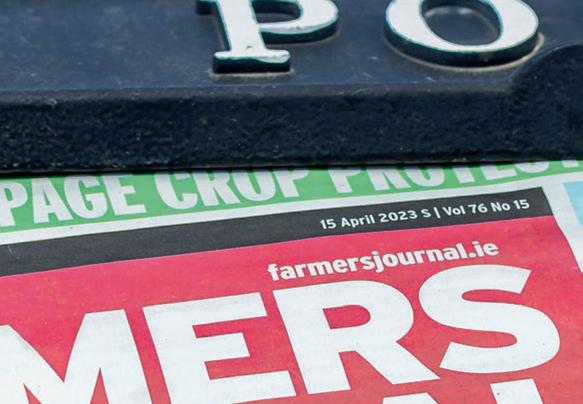

• Get the paper delivered to your door every Thursday
•
• All subscriptions include digital standard access
• Payment flexibility – pay monthly, cancel anytime












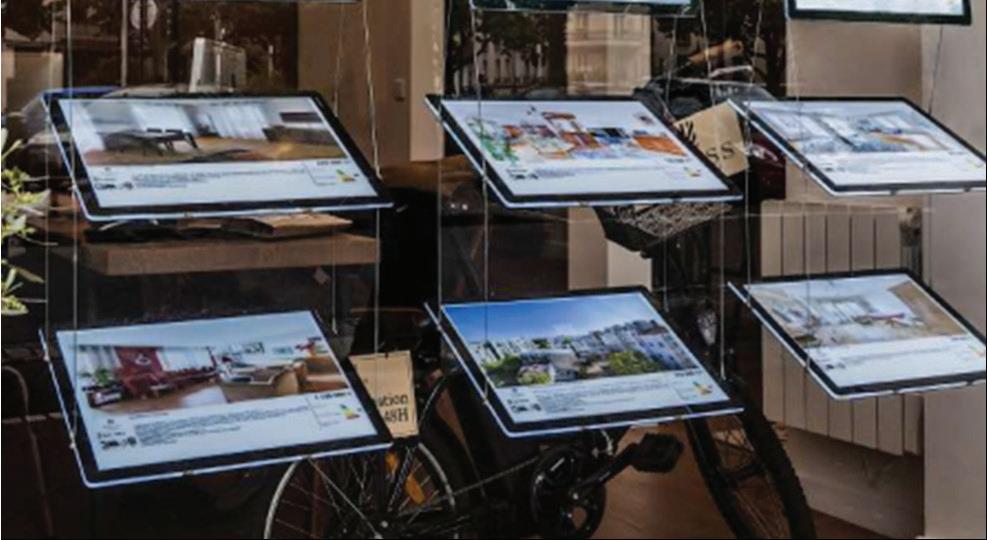

displays remarkable again with VM Cable & VM Clip Wall Systems.















Below dates and venues subject to change.
8th July – Closing Date
Higher Certificate in Business in Real Estate, Valuation, Sale & Management
Completed application forms must be received at IPAV no later than 8th July.

5pm – 22nd August
Young Professionals Network AGM
IPAV Head Office, 129 Lower Baggot Street, Dublin 2 (IPAV Members Only)
Register your attendance
Email jakub@ipav.ie to register your attendance.
6pm – 22nd August
Young Professionals Network Summer BBQ
IPAV Head Office, 129 Lower Baggot Street, Dublin 2
Register your attendance
Email jakub@ipav.ie to register your attendance.
5th September
YPN Annual Golf Classic
The Heritage, Killenard, Co. Laois
Register your team or email jakub@ipav.ie for details.
17th September
IPAV PSRA Live Webinar
Save the date, registration coming soon.
In a forceful speech at IPAV’s annual conference in Limerick on 14th June, IPAV President Lisa Kearney said that while progress has been made on housing, major delays and blockages remain with myriad strands operating independently with no mechanism to pull it all together, as recommended in the recent Housing Commission report. She called for the report’s recommendations to be addressed urgently and expressed IPAV’s concern that an inter-departmental group convened to develop recommendations for Government would not be the most effective structure to address the need and urgency of the issues.
Ms Kearney said major shortfalls in infrastructure delivery need to be addressed immediately and An Bord Pleanála must clear its backlog as a priority. Among other initiatives she called for were: innovative design solutions, access to mortgages across borders and bridging finance to be reintroduced. Kieran O’Donnell TD, Minister of State for the Office of Public Works, said the Planning and Development Bill currently before the Oireachtas would address many of the issues slowing housing development, streamlining and speeding them up. The new system would be “plan led rather than developer led,” he said. Over 200 members attended with a host of speakers delivering insightful and engaging content throughout the afternoon. Additional photo coverage featured in our events page.
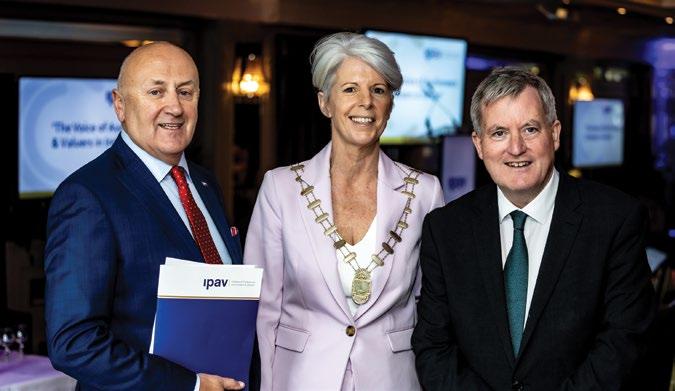
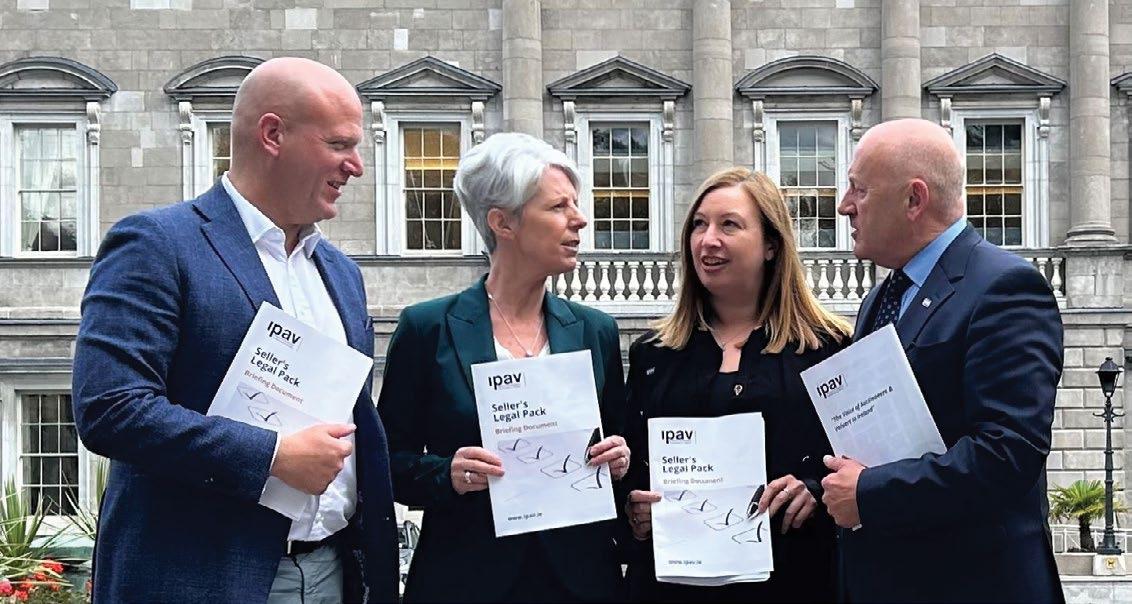
We are pleased to announce that the Seller’s Legal Pack for Property Buyers’ Bill 2021 will advance to pre-legislative scrutiny before the Oireachtas Justice Committee on 2nd July. This important milestone precedes the Committee Stage, where the Bill will be subject to further debate and potential amendments. The assistance of IPAV members in engaging with local representatives has been instrumental in driving the Bill’s progress through the Oireachtas, and securing a date for pre-legislative scrutiny. We will continue to provide updates on the SLP Bill’s progress and we remain grateful for your continued support as we help to reduce conveyancing delays, and improve the transparency and efficiency of the property buying process.

Each issue, we look at a matter of Equality, Diversity and Inclusivity, to help us all navigate different issues. This time, our EDI Officer and President Lisa Kearney looks at how to create an office that’s welcoming to all… Creating an equal, diverse and inclusive environment is crucial in fostering a sense of belonging and respect for everyone in the workplace. The impact that a lack of acceptance, inclusion, and equality can have on individuals, whether in the context of mental health support or personal identity struggles is all too real today.
Here are a few key points you might consider as you work towards implementing an effective EDI policy:
Cultivate a Culture of Inclusion: Ensure that management is dedicated to promoting equality, diversity, and inclusivity (EDI) within the organization. Management should demonstrate a commitment to these values and serve as role models. Celebrate the diversity of your workforce and the unique contributions that each individual brings to the table.
Acknowledge Individual Experiences: Recognize that individuals may have different experiences and perspectives based on factors such as race, gender, sexuality, disability, or socio-economic background. Acknowledging these differences is the first step toward creating an inclusive environment.
Provide Support Resources: Offer support resources for employees who may be struggling with mental health issues, discrimination, or personal identity challenges. This could include access to counselling services, employee assistance programs, or support groups.
Have Clear Diversity and Inclusivity Policies: These policies should cover areas such as fair hiring practices, equal opportunities for advancement and protocols for addressing discrimination or bias incidents. Review and revise organizational policies and practices to ensure they are fair, equitable, and inclusive.
Training for Employees
Offer training sessions and educational programs for employees on topics related to EDI. This could include workshops on recognizing, assessing and addressing unconscious biases, fostering cultural
Encourage open and honest dialogue about EDI issues within the workplace. Create spaces for employees to share their experiences, concerns, and ideas for improvement without fear of judgment or retaliation.
understanding, and using inclusive language.
Inclusive Workplace Culture: Foster a culture of inclusivity where every employee feels valued and respected. Encourage open communication, mutual respect, and collaboration among team members regardless of background or identity.
Establish Employee Resource Groups (ERGs): Support the formation of employee resource groups where individuals with shared identities or interests can come together to offer support, share experiences, and advocate for change within the organization.
Promotion of Diversity in Leadership: Ensure that diversity is represented at all levels of the organization, including in leadership roles. Encourage the promotion and advancement of employees from diverse backgrounds to positions of leadership and influence.
Flexible Policies: Implement policies that accommodate the diverse needs of employees, such as flexible working hours, remote work options, and family-friendly benefits like parental leave. Recognise awareness, cultural, and religious holidays.
Leading by Example: Lead by example and demonstrate your commitment to EDI principles through your words and actions. Show empathy, compassion, and respect for all individuals, and actively work to create a workplace culture where everyone feels valued and included.
By implementing these strategies, organizations can create a more equitable, diverse, and inclusive workplace environment where all employees feel valued and empowered to succeed.
We’re always happy to hear from you so please contact the EDI team




What does your shopfront say about you? A lot, if you’re Ronan Crinion. The managing director of MoveHome in Dublin has won numerous awards for his creative shopfronts, and he tells us why curating a unique display is crucial for your business.
“A lot of estate agency shopfronts are extremely boring. 95 percent of people walking by won’t even acknowledge that they’re there. But there’s a theory and an ethos behind visual merchandising, which I’ve done for many, many years. It attracts attention and it gets you business. A lot of estate agents don’t know anything about it.
The idea of a shop window is three things. First of all, it needs to attract your attention and make you look at the window, and at the brand. That’s done in two or three seconds. The second thing a window’s supposed to do is bring you over to it to make you look in, and that might be a minute. And the third thing it’s supposed to do is bring you indoors to buy.
A good window display is a craft, and it’s your business card. It attracts attention, but you have to interact and display differently. And that’s why I’ve won awards, because I don’t just put property in my window.
At any time, I have 23 properties on my books, but I create a window that’s more than just the properties. It needs to have curb appeal, to celebrate the seasons, to attract the eye.
The favourite one I’ve done that people still talk about is the one with the cups in the window. What I did was collect tea cups from the houses I was selling, and then found beautiful teapots in the shape of houses. I collected about four or five hundred tea cups, and hung them from the ceiling with the words ‘Drop in for a cuppa’.
Our Christmas window is always popular, and it features in the Angelus. We put beautiful wooden houses all around the L-shaped window with churches, with sale signs on them and Santa flying over them. We have beautiful windows for Valentine’s Day, too. I recently worked with a florist who covered houses in flowers and moss and I put watering cans hanging over them with plastic wire that looked like water. And the phrase was; ‘Would you like to put your roots down?’”

















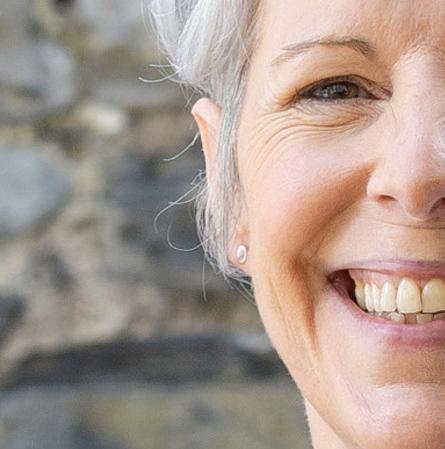





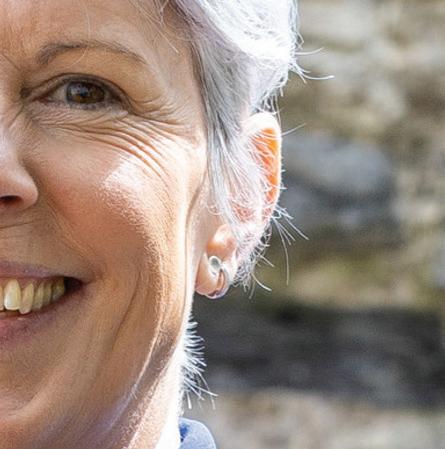

















We sat down with new IPAV president Lisa Kearney, to find out about her property background, her goals and what she loves about the industry.







How did you get started in the industry?
Rooney Auctioneers is a family-owned business which my father Pat started back in in 1970 so I have grown up around property and estate agency since I was born. You might say that we grew up with a gavel rather than a baby’s rattle in hand! I have always loved buildings and all to do with property, and one of my favourite places to be is on a building site. In fact, I worked for a time with Yeomans building Euro Disney in France which was an unforgettable experience with many “unpublishable” stories I can’t tell you! Today our agency is run by myself and my two brothers Gordon & Peter. After some years of travel I came home and I’m now officially working in the business some 33 years or so.
When did your relationship with IPAV begin?
I joined IPAV many years ago as it was such a progressive institute. It also put the agent and the betterment of the industry at the forefront. I recognised that IPAV is the only voice for all agents and auctioneers across the country and that continues. The enormous work that our CEO Pat Davitt, Genevieve McGuirk and Valerie Mogerley and all team at the institute do cannot be stated enough, and all of us members should be very proud of the institute and where it has come, especially in the last 10 years.
What are you looking forward to within the new role?
I am especially proud not only to be a member but also to be lucky enough to now represent IPAV as president and hope to follow the unique contributions and positive work of all the presidents before me. A key priority for our institute is promoting diversity, equality and inclusion. As this year’s president I am committed to continue to foster a culture of inclusivity, and belonging within our institute where every member feels valued and respected regardless of their race, gender, ethnicity, sexuality or background. I am also a huge advocate for mental health in all aspects of life but especially in our industry, as I know the stress and anxiety that working in sales and working with multiple personalities can bring.
“All across the country there are retirees and empty nesters living in large homes who are willing to sell, which would free up their homes for the middle movers but unfortunately they can’t find anywhere to go.”
What are your strengths?
This is an interesting question for a shy person! I’m a very good listener and am very non-judgemental, inclusive and fair. I believe in everyone being equal, respected and being heard. I am a people person and have people’s best interests at heart first and foremost. I’m very fair and very open to new ideas and learning new things. I’m also a very positive person and don’t dwell on the negative that life can throw at us. I have learned and experienced quite a lot in my life, and I have learned and grown from each one, so I like to encourage and support others to learn and grow from their own experiences no matter what that is. There is always someone to talk too, to listen to you and to really hear you.
What do you think are the challenges most affecting the property industry today, and how do you think we can address them?
Supply, supply and supply. We must look at how we can increase supply to the market – this is critical and has been for some time. While it has somewhat improved, a lot more needs to be done in order to drastically improve the amount of supply. One market that I constantly talk about is the retirees or “right sizers” market – this sector is ignored and is not being catered for at all. All across the country there are retirees and empty nesters living in large homes who are willing to sell, which would free up their homes for the middle movers but unfortunately they can’t find anywhere to go. The development of 2 bed villas, apartments or semi bungalows needs to be looked at and encouraged in order to cater for this market. The supply of the larger semi and detached home on the market would vastly increase if the “right sizers” had suitable properties to move to.
The market is evolving and redefining the way we live, work, and interact with our built environment. Sustainability,
environmental consciousness and technological innovation are emerging key drivers of real estate development in Ireland. With climate change becoming an ever-pressing concern, developers, architects, and policymakers are embracing green building practices, energy-efficient design, eco-friendly homes and sustainable development initiatives and the real estate sector plays a pivotal role in Ireland’s transition to a more sustainable future.
What has been a career highlight so far?
I would have to say becoming president of IPAV as the second only woman since 1970 and the first gay woman would certainly be up there in terms of career highlights. Also taking over and running a successful business along with my brothers would be high on the list also, and knowing that the next generation will hopefully be part of that too is really fulfilling.
If you could own a dream property anywhere in the world, where would it be?
I’m a true home bird and love everything about Ireland (except the rain when showing houses!) and I’m especially proud to be from and to live in Limerick. My parents are from Kerry and my wife is from Clare so I have affections for both of these places also, but if I had to choose I would say Palma, Mallorca as that is where myself and my wife Katherine go yearly. It’s got a rich culture and is a fantastic city with an edge to it and has the best of both worlds, giving the city vibe but also having the sea and beaches on its doorstep. The food, people and of course the architecture there are also just fantastic.














Experts agree on a need to make the process more equitable for purchasers. Here’s Pat Davitt on why...

 By Pat Davitt
By Pat Davitt



IPAV had the pleasure of hosting an international online conference on May 8th examining conveyancing systems across Ireland and the UK with a view to making the process of transferring property title from seller to buyer more efficient, secure and cost effective for consumers whilst addressing inordinate delays.
The conference marked the first public meeting of the new Conveyancing Review Coalition comprising IPAV (IRE), Propertymark (NI), the Conveyancing Association (UK), National Trading Standards Estate & Letting Agency Team (UK) and Scottish Conveyancers Forum (SCO).
The focus was on the need for change; including solutions, partial though they may be, that the respective jurisdictions have embraced, and the work left to do to ensure that the home selling and buying process is as certain and transparent as possible for consumers, and that they are enabled to better interact with the legal requirements impacting their property during its lifecycle.
There was consensus among participants that current conveyancing systems place the bulk of work to be carried out upon the buyer rather than the seller; that a change of mindset is needed
along with consumer education to adjust what was generally accepted are systems unfairly balanced against the buyer.
There was unanimity that to be effective, changes need to be underpinned by law.

Former Taoiseach Leo Varadkar late last year announced that a group, since set up, would examine the process around bidding. At the time he cited the Scottish model as having potential to deal with the current stresses being experienced in the Irish system.
Our Conveyancing Review Coalition has Scotland’s foremost expert, Professor Stewart Brymer of the Scottish Conveyancing Forum, as a member. He told our conference: “A potential purchaser should always be in an informed position to better understand whether or not to put in an offer for a property.”
He said Scotland has had the Home Report since 2008 and it works well, but the system isn’t perfect. The Home Report contains a Property Questionnaire completed and signed by the seller. The concept is enshrined in legislation. This, coupled with the Single Survey (containing a valuation of the property) is of considerable benefit to prospective purchasers. He told the conference the Scottish Government is looking at a review of the system saying: “the next step will be









to move to a fully digitalised system.”
And he said the legal profession in Scotland, of which he is a member, do not have concerns about losing business to estate agents.
On behalf of IPAV I briefed our colleagues on our Seller’s Legal Pack for Property Buyers Bill 2021 which passed second stage in the Dáil in October, on how it would not only speed up conveyancing but it would also ensure that only properties which are genuinely saleable come to market. It would prevent prospective buyers making offers and incurring the expense of engaging the services of engineers and surveyors for properties that end up being withdrawn from sale because of issues around title, rights of way and other such issues that often emerge late in the process. It would make market wide a practice that already applies in online auctions and public auction sales. However, as you will read elsewhere in this edition many challenges remain.




existing properties magnifies and compounds the problem and makes it increasingly more difficult to solve.

Our Northern Ireland colleague, Stephen McCarron, Board member of Propertymark Northern Ireland told the conference the Northern Ireland system is more cumbersome than that in Scotland, being more akin to the England and Wales systems. However, he said: “Hope is on the horizon” with the prospect of digital logbooks and collaboration and informing and educating consumers are important. He said digitalisation of the land register was critical.




I also discussed the subject of digitisation and stated that this should start on new properties immediately with each new property having its very own Digital Logbook when conveyed for the first time. Delaying digitisation until systems are in place to digitalise all
Beth Rudolf, Director of Delivery at the Conveyancing Association of England and Wales and co-chair of the Home Buying and Selling Group briefed the conference on the systems operating in those jurisdictions. She said on average it takes 22 weeks to convey a property. “Sadly, the system does not have the force of law,” she said. “You can only move as fast as the slowest person in the chain.” And, unlike that of Ireland, there is no regulation of agents. However, her organisation is working with the Department of Levelling Up, Housing and Communities to e ect change.
Emma Cooke, Policy & Information Manager, National Trading Standards Estate & Letting Agency Team UK, the

public regulator for the jurisdiction, spoke about the experiences of her organisation, the malpractices and remedies available. She spoke strongly about the lack of communication and information available to buyers. “Buyers do not choose the agent, the seller does,” she said.
Finally, Lorraine Higgins MD of Rockwood Public Affairs briefed participants on the next steps for IPAV’s Seller’s Legal Pack for Property Buyers Bill 2021 and the prevailing political climate in the run-in to the forthcoming general election.
One message was very clear from all of the excellent participants – that new conveyancing rules like the Irish Seller’s Legal Pack needs to be underpinned with legislation if it is to work.
I want to thank each and every one of our participants for their insights and say how deeply we appreciate your work. This collaboration is essential, it can help us all learn from each other’s experiences and work towards building conveyancing systems fit for purpose that are efficient and effective, that avoid unnecessary delays and above all fairly balance and serve the needs of buyers and sellers.
On behalf of IPAV I look forward to further cooperating with our colleagues with this aim in mind.
Traditionally,
selling and buying homes was a seasonal affair. But is that still the case?
We talk to two IPAV members to get their take on the topic…

“For me, the seasons have long gone. It’s probably been at least ten years since the seasons mattered in this industry. People still talk about the best time to sell or buy, but the best time to sell is when you’re ready to sell, and the best time to buy is when you’re ready to buy. Our trends in the office show that we’re as likely to have a better December than a September. I used to say “the seasons are all over the place” but I’ve actually arrived at the belief that there’s no such thing as a buying or selling season. What I have found, particularly since Covid, is that people have gotten a lot more focused and sharper at when and why they buy during the year. People have really taken their breaks and their holidays, they turn off their phones when they’re away. With summer purchasing, I find that families are buying relating to the school holidays, making a decision around where the kids will get a school place. They’re then very focused on the kind of properties they want, and when they arrive everything is in place with their financing, their ducks are all in a row. I find from the end of February pretty much to the end of May, everything right up to the point of the kids finishing for school is a busy time for families buying.”

MariaLehane Bowe Property, Co.
Cork
“Anyone considering putting their property to the market are still of the mindset of waiting until literally ‘Spring has Sprung’. I believe most people will agree that everywhere looks much more exquisite in the spring and summer season, with the smell of freshly cut grass and an array of shrubs and flowers in full bloom. This is most certainly a big factor for potential vendors putting their property to the open market in the hope of achieving the best possible results, and showcasing their biggest asset in its best possible light. There is no doubt January and February are generally quieter in terms of launching certain properties to the market, with potential vendors generally getting advice from our agents in terms of staging the property, how best to present the property and advise on external works in terms of power washing, painting etc ‘once the weather improves’. In terms of potential purchasers, it appears to be more appealing to view a property during the spring / summer season, noticeably because of more supply in the market but also with the hope of securing their dream home with the anticipation of completing the transaction before the winter sets in. September has also been historically a good time to launch a property to the market and has generally been a busy time for us, with sales being agreed before winter and before everyone gets caught up festive activities that appear to be happening earlier and earlier year on year.

How did you get started in property?
In secondary school, as part of our transition year program, we had to do two lots of work experience, one in October and one in March. For both, I worked in two different auctioneering companies, one being DNG, funnily enough. That was my first taste of working in the property industry and I really enjoyed it. I just love everything about houses, buildings and interiors.
When I applied after my Leaving Cert to go to university, I actually didn’t get enough points. So I had to look at alternative options to get into the property industry. I did a one year PLC course, then I started working with WYSE, whom I was with for seven years, during which time I did a part time course in DIT. It’s probably just as well, as friends of mine who graduated from the property course in university struggled to get work in the recession and had to emigrate. I’ve been very fortunate in the routes that have presented themselves to me.
What does an average day look like for you?
There’s no such thing really as an average day, but I can tell you about an average week. I work hybrid, on Mondays I’m in the DNG head office in Ranelagh where I have my weekly scheduled meetings. On Tuesday and Wednesday I would either be in the office or I’d be on the road with my business partner, Tony Forte. We’ve got 65
In this issue’s member spotlight, we meet Niamh Comber, Head of DNG Nationwide, to discuss her background in property, her passion for mountain climbing and life in her very own vineyard.

franchise offices around the country, and we would conduct business strategy meetings with each office at least once, if not twice a year. I then have two days working from home a week, where I catch up on my admin, draft new policies, procedural manuals, plan for the future, that sort of thing.
What do you do in your spare time?
I’ve set up a vineyard on myself and my husband’s farm in Wexford. We planted our first vines in May, seven varieties, a combination of white and red, and they’ve taken really, really well. I’m looking forward to our first crop in three years’ time, and tasting the fruits of our labour! With the amount of really good quality wines that you can get from the UK, I thought, why not chance it down in Wexford? You can follow our progress on Instagram @ theirishvineyard.
If I’m not working, I am traveling somewhere either in Ireland or overseas. Myself and James are climbing Mount Kilimanjaro in July this year, so an awful lot of our time has been taking up with hiking and training. I’m really looking forward to it.

Before we actually climb Kilimanjaro, we’ve got a safari for a couple of days out in the Serengeti and then after Kilimanjaro, we’ve got a little bit of R&R on Zanzibar. So nobody will see me for three weeks! And the phone will be off….
 Tommy Barker Property Editor, Irish Examiner
Tommy Barker Property Editor, Irish Examiner
Every day we get reminders of the passage of time: it can be on waking, when the bones might creak just a little bit (more); it might be making it to the bathroom (again) to see a brutal reality (less hair/nose hair) reflected in the vanity mirror.
Or, it might be forgetfulness …like forgetting it was pretty much the same yesterday morning too.
For those in the property game, the passage of time might show in spotting trends, wearily noting ‘here we go again’ on wider market cycles, or dealing with the same issues, only with di erent folk. For want of a graphic example, it comes when visiting a property and realising: “I’ve been here before.”
Estate agents with years under their belts will reach the stage when they resell one of their previous successes – going out for a second date with the sellers, as it were.
In property, as in life, there can often be a sense of déjà vu. Tommy Barker looks at how time flies…
There’ll be memories of the previous encounter, perhaps. “Ah, that’s the one where the floor had that dodgy spring in it. Nice new floor now: selling point?”
‘’That’s the one when the seller’s dog bit me.” Or, “the buyer’s partner had a bite. Better watch out.”
Possible too is dismay as ‘home improvements’ done in the interim may have made a place less sellable, not more so, in which case, bite your own tongue, and get on with the pitch.
Thankfully, for variety’s sake, it’s rare that when a particular property comes back for sale that it’s exactly the same, or the seller’s circumstances are similar, or that the market mirrors that of the first time around.
There’s truth for buyers in the old saw that “the day you buy is the day you sell.” For selling agents this can be mildly tweaked to pronounce that “the day you sell is the day you sell…. again.”
Barring the banality of many an investment property where ‘neutral’ is a bonus, it would become a pretty boring business if a home’s second, or even third, market outing was a rerun of the first.
Seven Year Itch?
The length of time owners stay in a home can vary: some are lifers, others are moving up or down the notional ladder, as
circumstances or income or employment needs change.
International trends and comparisons for length of ownership of a home vary, generally put at 10-14 years by the most closely-analysed US market.
Other research indicates the typical period of home ownership/occupancy has lengthened of late, due to things like a global pandemic, currently risen interest rates and market fluctuations with wars currently raging abroad chiming with a near-historic low of properties o ered on the Irish market.
Research done here in a pre-covid 2019 market, Residential Satisfaction in Ireland, published by the National Housing Agency, found very high satisfaction levels among Irish homeowners, with 92% of 1,300 respondents surveyed either being ‘satisfied’, or ‘very satisfied’, with their current home.
Possibly adding to any feeling of domestic smugness was the additional finding that Irish homeowners were almost twice as likely as renters to be ‘very satisfied’ with where they lived, at 57% vs 30% for renters.
Ah, but does the shine not sometimes come o , in a sort of bricks and mortar equivalent of the seven-year itch?
The same survey found the most common complaint of both owners and renters was a shortage of space; in fact, the only instance out of a list of twelve topic where owners
voiced a higher level of dissatisfaction than renters did was finding their ‘home too big for current needs.’
Now, far be it from me to suggest that auctioneers looking for a resale should ever highlight the negatives. Another cynic might indeed find no surprise in their happily agreeing with a buyer’s reason for buying (at the time), and a seller’s reason for selling (now), whilst rationalising to themselves ‘they made their bed, and they got to lie in it.’
It’s just good business.
This ‘buyer becomes seller’ dynamic when re-engaging with the same auctioneer some time further down the line can, of course, be peculiar, when the rhetoric that wooed becomes rehashed as reality, on the other side of the, um, ‘bargain’.
At the risk of overpaying the relationship metaphor, what might have been awkward the first time around can become amusing the second time around, or in forgiving recall.
The thought struck home when assessing a property for newspaper editorial, and ‘before’ and ‘after’ points were quite naturally being highlighted for mention by the sellers, the repeat agent and a certain journalist on a ‘you won’t believe it’s the same property’ pitch revisit.
It was your classic’ starter’ home, sold in 2016 for €175,000, now back on the ’24 market after a style makeover, from grunge to glam, at a not too eyegouging €250k.
The couple recalled that their own
first viewing of the ex-rental included the discovery of a student soundly asleep in one of the beds…
Naturally, their ‘shock’ find made the published story’s amusing ‘intro’, with a suitably wry reference link to the cult Withnail and I and that film’s portrayal of domestic squalor.
Gentler readers of broadsheet newspapers might not realise the professional cliché that many a seasoned auctioneer has his or her story of who, or what, was found when, where and how in a bed during a sale viewing, and just how adroitly they dealt with it.
Now, there’s a book (and not just a column) in that: ‘Kiss, and sell?’
“It would become a pretty boring business if a home’s second, or even third, market outing was a rerun of the first.”

Michael Brady guides us through some farm entitlement tips…
The trading of farm entitlements for 2024 has now closed and surprisingly there was no extension to the closing deadline. This caused many late nights for agricultural consultants and advisors around the country. The trading of Basic Income Support for Sustainability Scheme (BISS) entitlements was difficult this year as farmers were busy out in the fields with the 2 week window of good weather before the deadline. However many entitlements were still traded by registered agents by selling, buying, leasing in or leasing out. Here are of the important take aways from BISS 2024:
1
Buying v Leasing There was no clawback on the sale of BISS entitlements again in 2024. This caused those with surplus entitlements to consider selling their entitlements instead of continuing to lease them out again this year.
2
Prices This year, selling/buying entitlements made around x 2.5 time their value similar to last year, however leasing entitlements are back and making in the region of 50% of their 2024 value.
3
When buying/selling entitlements at 2.5 times their base value, it is important to take the average BISS Unit value for the 4 years between 2024 - 2007.
4 Organise finance early Organising finance was a hindrance to buying entitlements this year. Farmers were busy and banks are slow. Buying entitlements is a bigger sum to pay than if you have been traditionally leasing in every year. Therefore some cash tight famers leased in entitlements whereas their preference would have been to buy.
5
Fees Most agents charged in the region of 5%+vat @23% for buying and selling. Minimum fees apply (€150+vat per transaction) as a small number of entitlements to trade generate fees that are too small to make the transaction worthwhile for agents. A licensed trustworthy agent is a value for money agent.
6
7
The 2 year rule There was a 2 year ‘use it or lose it’ rule with entitlements again this year.
Single or part of an entitlement All advisors/ consultants and agents were ‘flat to the mat’ busy before deadline. Licensed agents did not have time to be negotiating for low value entitlements, some owners of entitlements fail to recognise this fact.
8
BISS amendments There is a 25-calendar day period after the 15 May closing date for the acceptance of late BISS applications and any necessary supporting documentation. However, deductions to payments at a rate of 1% per working day in respect of BISS will apply to late applications which are received during this period. This period does not apply for the transfer of entitlements.
The Department of Agriculture Food and Marine (DAFM) require the Transfer Confirmation Signature Forms to be witnessed by a solicitor or peace commissioner again this year.
The tax treatment of income received from entitlements must be considered when selling or leasing entitlements. There is Capital Gains Tax (CGT) on selling which may be a 10% or 33% rate depending on your situation, get taxation advice before you sell.
The trading of BISS entitlements is a niche/ specialised market area, select an experienced agent or Electronic Transfer Facilitator (ETF) to trade and transfer your entitlements and trust them to do the business for you.

Mike Brady is an Agricultural Consultant and Managing Director at Brady Group
Brady Group: Agricultural Consultants & Land Agents. The Lodge, Lee Road, Cork. Tel: 021- 45 45 120 email: mike@bradygroup.ie
One of the challenges facing the estate agency business is insu icient supply of not alone new homes but also second hand ones. But perhaps supply of second hand homes may be about to increase from the unlikely source of institutional investors.
According to Sherry FitzGerald research, there was a 27% decline in numbers of available second hand homes for sale between January 2023 and January 2024, and a 46% fall since before Covid in 2020 with only 11,050 second hand properties listed for sale in January this year.
“Rural areas, especially counties like Sligo, Roscommon, Mayo, Kerry, and Westmeath, are disproportionately a ected by supply shortages, experiencing stock decreases exceeding 55% within a four-year span.”
Another concern is the shortage of housing
Donal Buckley looks at a potential new source of second-hand housing.
 Donal Buckley Property Columnist, Irish Independent
Donal Buckley Property Columnist, Irish Independent
in lower price categories, with the sub€200,000 range experiencing a substantial 35% drop, leaving only 2,500 properties available for purchase nationwide.
The analysis also reveals substantial declines in housing stock across all four provinces since 2020, with Ulster experiencing a 53% reduction, Munster seeing a 50% decrease, Connacht encountering a 49% decline, and Leinster witnessing a 40% drop over the four-year period. In Dublin, the available stock for sale in January 2024 totalled 2,600 units, marking a 30% reduction from 2020, the report says.
These shortages come despite the fact that average values in Ireland’s second-hand market had grown “96.5% since the bottom of the market but at the end of 2023 remained 15.9% o their 2006 peak,” the report said.
That would not come as a surprise to economist David McWilliams who has long argued that rising house prices discourage home owners from selling in the expectation that they will be better o by holding onto them.
In 2022 rising interest rates combined with inflationary pressures on the economy and job cut-backs in tech firms were expected to cool the housing market and there was even the possibility that some home owners might be under pressure to sell. However towards the end of last year inflation was being tamed and expectations on interest rates were reversed.
The Government cut a pay deal which appeared to recognise the need to compensate for inflationary pressure on public service workers. Renewed optimism saw the pace of house price inflation accelerate in the first three months of this year according to DNG when Dublin resale property prices increased by 1.9 per cent – more than double from 0.9 per cent over the same period in 2023.
If that pace of house price inflation were sustained then prices might increase by 8% this year - up from 5% last year. However, Sherry FitzGerald believes that the pace price increase will moderate later in the year and predicts 2024 increases will be confined to 2-3%.
Nevertheless in the face of a healthy economy, low interest rates and rising prices, it will continue to prove di icult to increase supply of second hand homes.
One source of supply are investors who are selling their stock. In the three months to
the end of March, Sherry FitzGerald estimates that investors accounted for 35% of second hand properties sold. Now the question arises as to whether some of the institutional owners of large residential portfolios will follow the example of smaller investors who are departing the market.
Already the market has seen how the flow of institutional investment slow to a trickle. Furthermore increased interest rates and the strictures of Ireland’s rent control system, have curtailed institutional investment in the private rented sector and the yields for such investments have risen from less than 4% to 4.75%. On the basis of McWilliam’s opinion, one wonders if that weakness in yields and pricing could be the catalyst for sell-o s by institutional investors.
However Ross Harris of Sherry FitzGerald says that to his knowledge, “the institutional investors are not selling o units on a piecemeal basis.”
Indeed the biggest investment deal of the first quarter of this year saw German fund KGAL’s purchase 104 apartments at Shackleton Park in west Dublin for €42m.
Although John McCartney of BNP Paribas Real Estate says that deal was against the run of play.
On the other hand Ireland’s largest landlord, IRES REIT, recently indicated that because European real estate assets are at “historically low” levels of liquidity including in Ireland, it is considering some “selective asset recycling” to achieve value as well as the sale of individual houses or apartments.
Indeed it makes sense that if prices are weaker for bulk sales at a time when prices are strong for individual sales, then it is better to sell in small lots. Further to that the Sunday Times noted that IRES’s older apartment buildings “are a tough sell in a world where environmental ratings form a key criterion. When A-rated apartments are going up all
over Dublin, IRES’s portfolio is less attractive, especially when so many investment managers have stringent ESG compliance to overcome. In contrast, modest BER ratings need not be a deterrent for owner occupiers and those smaller private investors who are still buying.
Indeed other corporates with older apartments might well avail of the same demand. Admittedly there may well be restrictions on the sales of those apartment complexes which were designed solely for the rental market. However a number of blocks, while earmarked for renting, were actually built to the higher design standards which would facilitate their sale to owner occupiers.
So perhaps institutions might well provide supply of second hand homes to owner occupiers. If so it may well be that the so called cuckoo funds which previously outbid Irish home buyers may be about to embark on their travels to sunnier climes.


Whether you are looking to buy, sell or you are happily staying put, be inspired by Property & Home magazine in Saturday’s Irish Examiner.
• We bring you through the keyhole of a range of properties on the market each week, from rural retreats to urban sophistication.
• Our Home section opens the door to the latest, must-have interiors trends, from sublime sofas to cosy cushions.
• Garden lovers can dig deep with expert advice.
Plus antiques and fine art with a diary of upcoming events not to be missed.
To advertise in Property & Home magazine email propertyads@examiner.ie

Reach your audience with The Irish Times Group:















If you require a locksmith make sure you choose one licensed by the PSA.
Any person or business providing locksmith services must be licensed by the PSA. It’s the law.
Using unlicensed providers puts your business at risk as you could:
• Face Prosecution
• Invalidate your insurance cover
• Compromise the safety of your staff and customers
To ensure that your locksmith is licensed with the PSA visit www.psa-gov.ie





As BusConnects Dublin Routes advance towards CPO stage, Niall Brereton looks at the stages involved.
An Bord Pleanála has recently granted approval for two BusConnects Core Bus Corridor Schemes from Li ey Valley to City Centre, and from Bellfield/Blackrock to the City Centre. These approvals mark significant milestones as the first of twelve proposed routes under the National Transport Authority’s BusConnects Dublin project to secure planning consent.
Further Bus Corridor improvements schemes are also planned for Cork (eleven routes) with preliminary route studies also underway for Galway, Limerick and Waterford. .
It is expected that all twelve Dublin corridors will be completed by 2030, with the first construction contracts to be awarded at the end of 2024 and on-site construction commencing in early 2025.
Following An Bord Pleanála’s approval of the schemes the National Transport Authority (NTA) is likely to commence the formal compulsory acquisition process of the land required to facilitate the scheme works from individual landowners. The next stages in the CPO process are likely to be as follows:
• Service of a Notice to Treat by the Acquiring Authority;
• A Notice of Entry which grants the Acquiring Authority possession of the land;
• Submission of a Statement of Claim for Compensation by the Landowner;
• Negotiations between the respective sides Valuers.
Under current legislation, an acquiring authority has a period of up to 18 months in which to serve a Notice to Treat in respect of the lands which they intend to compulsorily acquire. However, in this instance it is likely that the NTA will instigate the Notice to Treat in the short term given that construction is scheduled to commence next year.


The Notice to Treat is a very important document insofar as it establishes the acquiring authority’s right to acquire the land and it copper-fastens the landowners’ entitlement to compensation. It also has the following e ects:
• The date of Notice to Treat becomes the Valuation Date for the purposes of assessing compensation.
• It fixes the legal interest in land to those pertaining as of the date of the Notice to Treat.
• A Claim for Compensation is usually sought from the Claimant within two months of the Notice to Treat date.
Following service of the Notice to Treat, the acquiring authority can subsequently serve a notice of entry and become the de-facto occupier of the land and allow construction works to commence notwithstanding that a sum of compensation may not yet have been agreed let alone paid to the claimant.
Importantly, impacted landowners should note that the NTA is obliged to pay the reasonably incurred professional fees of the landowner in dealing with the CPO process. Professional advice may be sought from multiple disciplines such as Town Planning Consultant, Consulting Engineer, Solicitor and Chartered Valuation Surveyor, depending on the nature and quantum of the land acquisition.
Given the scale of the BusConnects project across Ireland’s main cities, property professionals can expect a surge of enquiries from a ected property owners over the coming months.
Niall Brereton is a Director of Professional Services in Bannon Chartered Valuation Surveyors & Property Consultants

Brian McHugh, chair of the Competition and Consumer Protection Commission, tells us why the current solicitors’ monopoly on conveyancing must end.

After a long wait, the Legal Services Regulatory Authority (LSRA) has released its report into the possible introduction of a conveyancing profession. The report makes a number of key recommendations, including increased price transparency, digitisation and consumer awareness campaigns, but falls short of recommending opening the market to a new conveyancing profession.
Slow conveyancing services have been blamed for causing property transactions to fall through, while one in three Irish consumers consider high costs, including solicitors’ fees, to be a barrier to switching their mortgage. In countries similar to Ireland that have a dedicated conveyancing profession, fees are lower and service is faster. In New Zealand, for example, conveyancing only takes four weeks and costs a third or less of what it costs in Ireland. Buying a home is expensive – consumers would no doubt welcome the savings.
England and Wales have a very similar legal regime to Ireland and have had a licensed conveyancing profession since 1987. Between 1989 and 1998, the average cost of conveyancing a £65,000 house fell by 25% even though conveyancers only secured a 5% market share. In Ireland, there were 61,000 residential transactions in 2022, generating an estimated total of €110 million in conveyancing fees. Only solicitors can provide conveyancing services in Ireland even though, as the LSRA report acknowledges, for the vast bulk of this
work, it shouldn’t require a full solicitors’ training. This is a monopoly, and monopolies are bad for consumers. Slow conveyancing services have also been blamed for property transactions falling through. The introduction of a new profession would drive competition and benefit consumers.
The proposal to create the new profession was first made by The Competition Authority (predecessor organisation to the CCPC) in 2006. However, the OECD has been recommending reform to the delivery of conveyancing since 2001 and reforms were first proposed as far back as 1982. The decision to recommend other reforms without a separate profession means that a key part of the package is missing.
The CCPC welcomes the other reforms proposed in the LSRA report which include digitalised services, increased price transparency and consumer information campaigns. However, it is our view that these will only be truly effective in a competitive environment where new, innovative business models can drive improvements for consumers.
That is why we are calling on the Government to end the current monopoly by setting an immediate timetable for the introduction of the new profession. Irish consumers have been waiting for decades for real reform to conveyancing. Without action by Government now, they could be waiting another decade or more.

Social media is a tool that’s getting more important by the day, but it can be an overwhelming job. Here, Marketing Consultant Sean Daly gives his expert advice for how to make it work for you.
As a marketing consultant, I deal with many clients from all different types of businesses, and the biggest issue for most of them is trying to find the time to do what they need to be doing. Managing your social media accounts requires a strategic approach to maximise visibility, engagement, and ultimately, new customers or buyers. By using these strategies, real estate professionals can effectively manage their social media accounts and drive more leads. The key is to remain authentic, consistent, and responsive to build trust and maintain a dynamic online presence.

Social media is not just about broadcasting messages but also about engaging with your audience. Respond to comments and messages and participate in relevant conversations.
1 Create a Comprehensive Content Strategy
A robust content strategy is crucial. This helps in tailoring content that resonates with potential clients, either buyers or potential sellers. Mix your posts with property listings, market updates, home improvement tips, and client testimonials to keep your audience engaged.
2 Consistency is Key
Consistency in posting schedules is essential to keep your audience engaged. Create a content calendar to plan what you are going to post about so you know what you have to do in any month.
3 Use Hashtags Strategically
Hashtags can significantly increase the reach of your posts. Research and use popular real estate-related hashtags, such as #RealEstate, #HomeForSale, and #PropertyManagement, as well as local hashtags to target your specific market. However, avoid overloading posts with too many hashtags.
4 Targeted Ad Campaigns
Paid advertising on social media platforms can provide a substantial boost to your visibility. But it’s important to know how these tools work. Platforms like Facebook and Instagram offer advanced targeting options that allow you to reach specific demographics. Invest in targeted ad campaigns to promote listings, open houses, and brand awareness.
5 Analyse and Adjust Regularly analyse the performance of your social media efforts. Use the built-in analytics tools provided by most platforms to track metrics such as engagement, reach, and follower growth.
Video content has become a cornerstone of social media marketing. Use a mix of video tours, client interviews, and live Q&A sessions. Live videos, in particular, can generate significant engagement as they provide real-time interaction with your audience.
Real estate is a highly visual industry. Invest in professional photography and videography to showcase properties in the best light. Virtual tours and drone footage can offer immersive experiences. All platforms thrive on high-quality images.
Contact: Sean Daly sean@seandaly.ie

Tony Wallace, lead valuer for IPAV, talks to us about common valuation errors and how to avoid them.

I see from my inspections of valuer’s reports for both TRV’s and REV’s, several common re-occurring errors. I’m going to go through some of the most important errors below and advise on how they can be mitigated against.
The European Valuation Standards (EVS) are ever evolving, as is our approach to valuations. The most recent version of the EVS is the 9th edition, published and in place since 2020. It brought several amendments and additions. One such change was the definition of Market Value below:
“The estimated amount for which the property should exchange on the date of valuation between a willing buyer and a willing seller acting independently of each other after proper marketing wherein the parties had each acted knowledgeably, prudently and without being under compulsion.”
Some variations of the definition of Market Value can be found in valuation reports but it’s imperative that the most up to date definition EVS 2020 of market value appears in each valuation report. Valuers must understand these standards are being written and improved every four years. TRV & REV valuers will receive a new Blue Book in January 2025 when the 10th edition will be issued. Banks also keep themselves up to date with these standards, so if you insert the incorrect EVS version your valuation may be unacceptable to the instructing bank.
From my experience in industry, Terms of Engagement (TOE) can be used as a clear guide on what you are valuing, when you are to value it and on what basis you are to value. It greatly helps if your TOE is robust so that you have a clear understanding on what it is you are valuing, and the client has a clear expectation of you as a valuer.
When completing your valuation report, the report should align to what has been agreed and stated in the TOE. It is so important not to go outside the TOE you issued to your client, this continually happens in Valuation reports. Pages 62 of EVS 2020 gives a great guide to what a TOE should consist of.
Transparent report writing.
It’s important that your client can understand the process you have undertaken to help formulate your opinion of market value by reading the report. A key component to this process, is your investigation and analysis of the comparable evidence. It’s a must and very good practice to speak about this in the commentary and methodology process in your valuation report.
The following 5 points could form part of such commentary.
1. Giving specific details of the stage of the sale of the comparable properties used e.g. under offer, sale agreed with contracts signed or not signed or sold and sale has closed.
2. Stating the source for the comparable.
3. State what confirmation you received that the comparable sales were arm’s length transactions. i.e. the values represent open market value.
4. Listing the comparable evidence in a hierarchy starting with the most influential comparable at the top of the list and least at the bottom.
5. Stating the adjustments made to the prices of the comparable properties when compared to the subject property and reasons for the adjustments. e.g. prices agreed for property X has been increased/decreased by Y % when compared to the subject property because ....
It is very important for a valuer to remember your report may be your client’s first read and view of this property. You must paint a picture that when the clients view and read the report, they know as much about the property as you, the valuer.
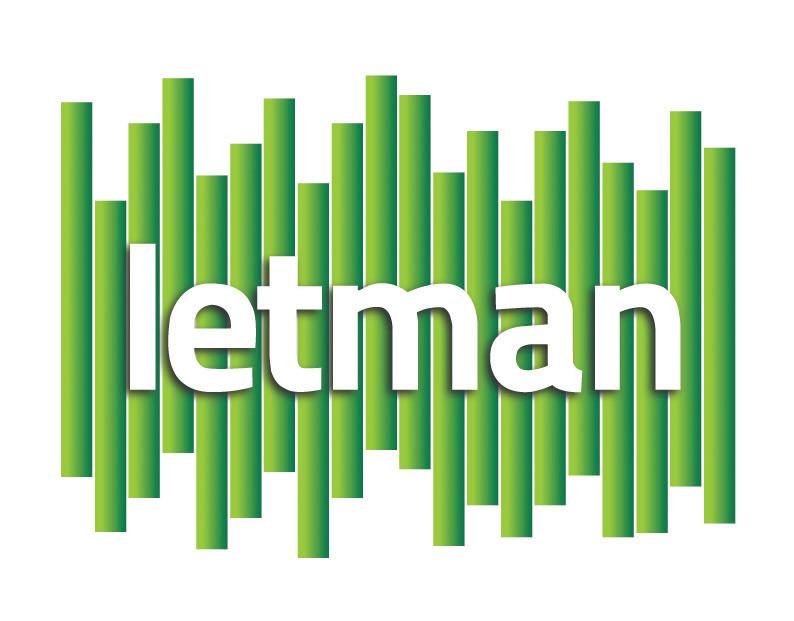
Letman manages the client account in its entirety, showing you a balance sheet for the client account and real time information on funds allocated to the Landlord, the Tenant, the Contractor or the Agency. Letman produces SEPA payment files for the landlord and suppliers. Letman is designed in full compliance with Statutory Instrument 199 of 2012, Property Services (Regulation) Act 2011 (Client Moneys) Regulations 2012.
Letman is the complete so tware solution for tenancy administration of residential property units. Letman is a tenancy administration solution that steers you through the complexities of the Residential Tenancies Acts 2004. Automatic updates in response to changes in legislation.
Letman can also be bundled with the web portal Myletman providing secure logins, documents and accounts information for landlords and tenants. Myletman also provides for secure E Signatures for tenancy documents or any landlord, property, tenant or other related document.
Full document management at Landord, Property, Tenant and Lease level.
We understand tenancies and we understand client accounting. We will guide through migrating from a legacy system or a manual system and work out a migration plan that best suits you.

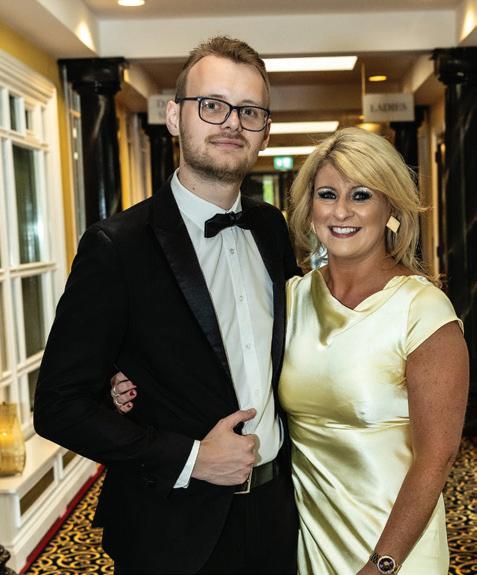
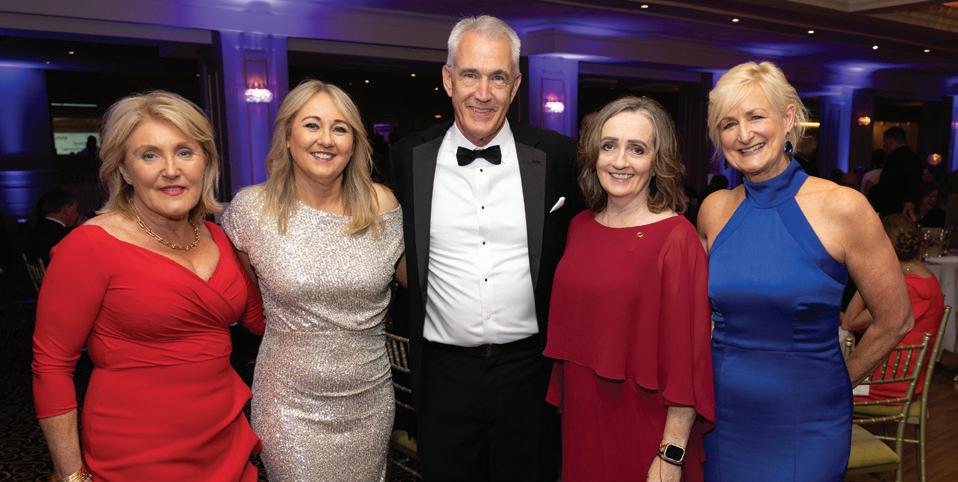



Greenhills Hotel, Limerick 14th June 2024
Thank you to so many members and guests who attended this year’s Gala Dinner, where everyone had the opportunity to relax and catch up with friends and colleagues. On the night, excellent speeches were given by Lisa Kearney, IPAV President, and Brent Pope, our evening guest speaker who both captivated the room.
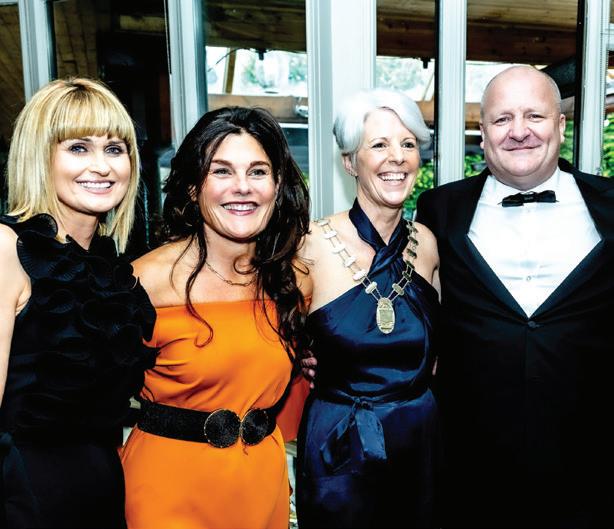
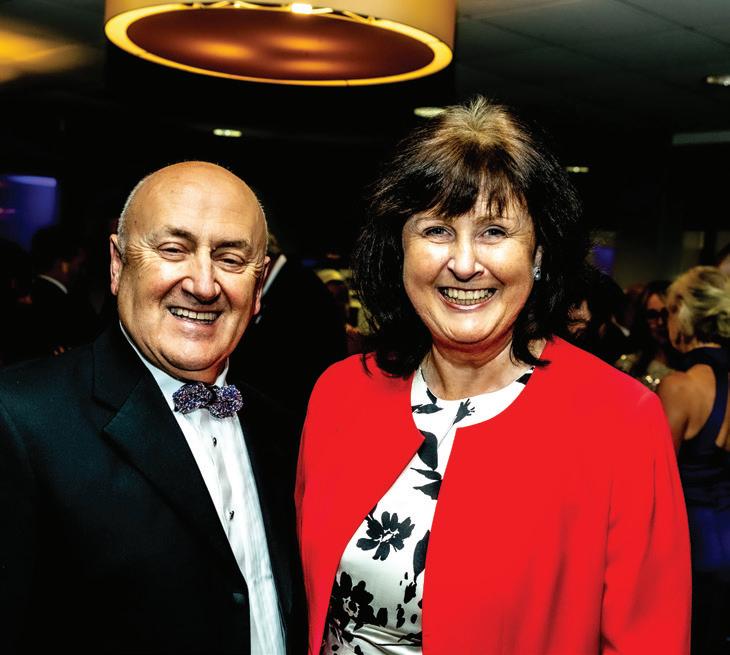
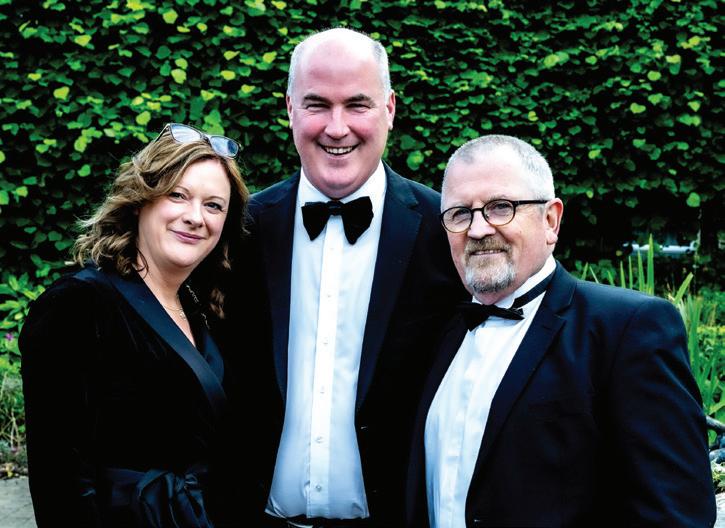
LEFT: Representing IPAV at the European Association of Real Estate Professions (CEPI) General Meeting, Pat Davitt, IPAV CEO and John Kennedy, IPAV Immediate Past President meeting with delegates throughout the two day programme. CEPI General Meeting, Munich, Germany, June 2024. RIGHT: Attending TEGOVA’s Spring meeting are Pat Davitt, IPAV CEO, Ella Dunphy, IPAV Council Member and TEGOVA European Business Valuation Standards Board member, and John Kennedy, IPAV Immediate Past President. TEGOVA Spring Meeting, Bucharest, Romania, May 2024.
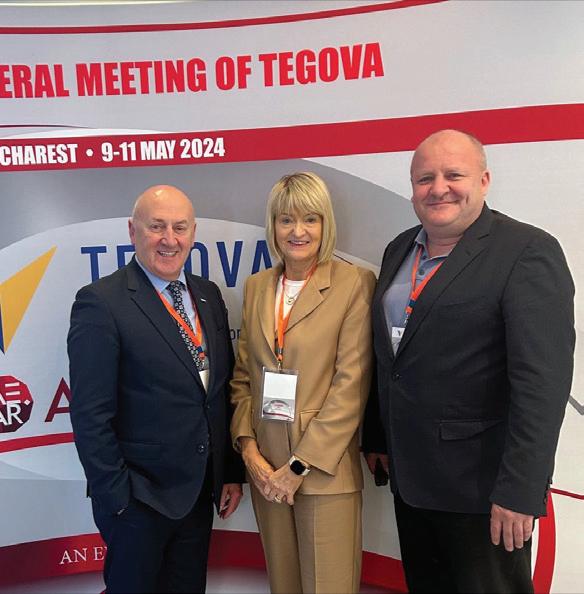
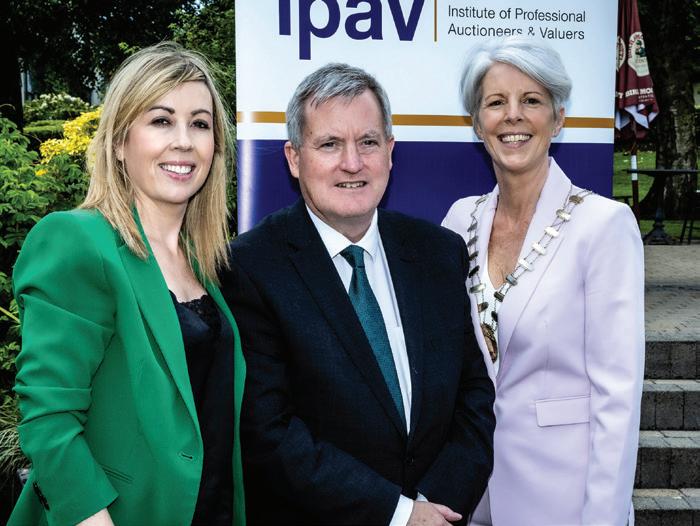


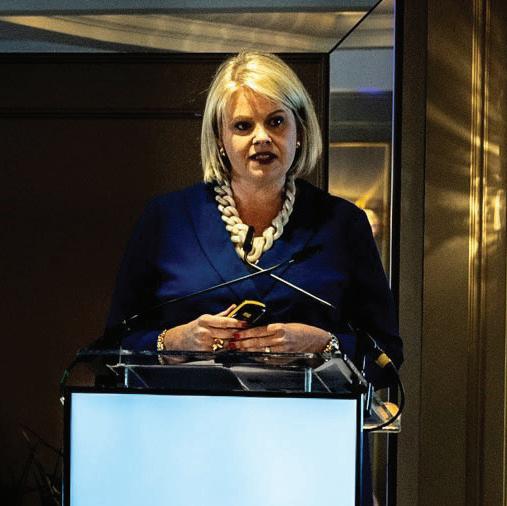
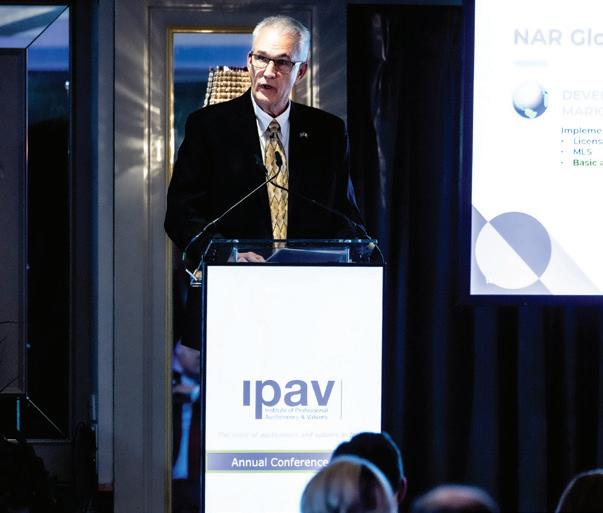
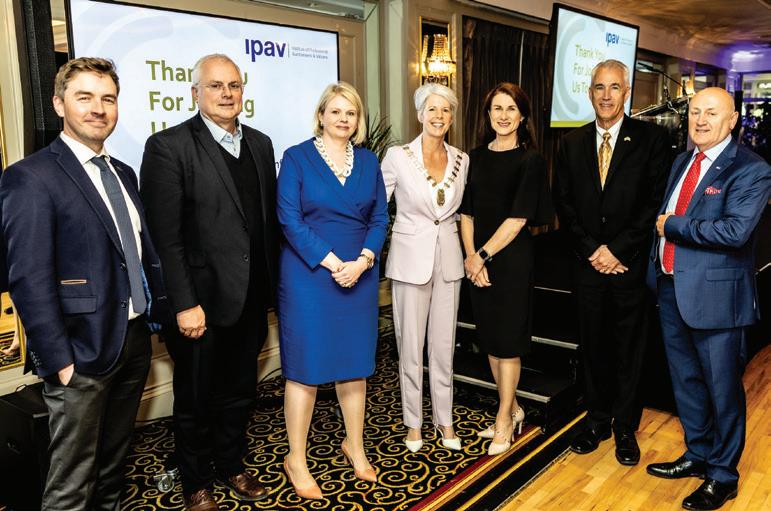
Greenhills Hotel, Limerick 14th June 2024
We were delighted to see everyone at this year’s event, and sincere thanks to our panel of excellent speakers, members, and guests for taking the time to be a part of a great day, and to Greenhills Hotel for their exceptional hospitality. There was strong audience engagement on the day, thanks to our expert speakers, and addresses by Kieran O’Donnell TD, Minister of State for the Office of Public Works; Lisa Kearney, IPAV President and Catriona Tierney, Conference MC.

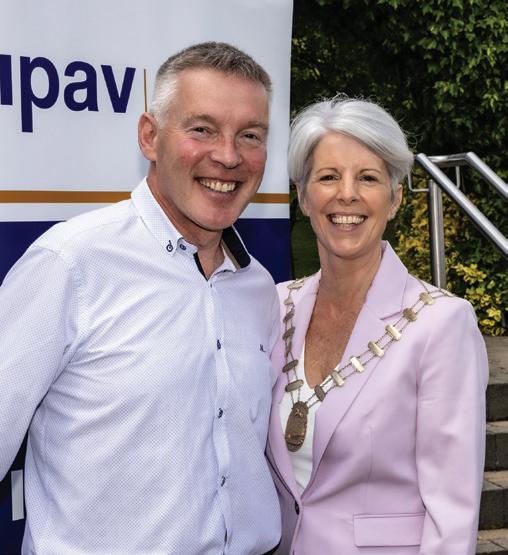
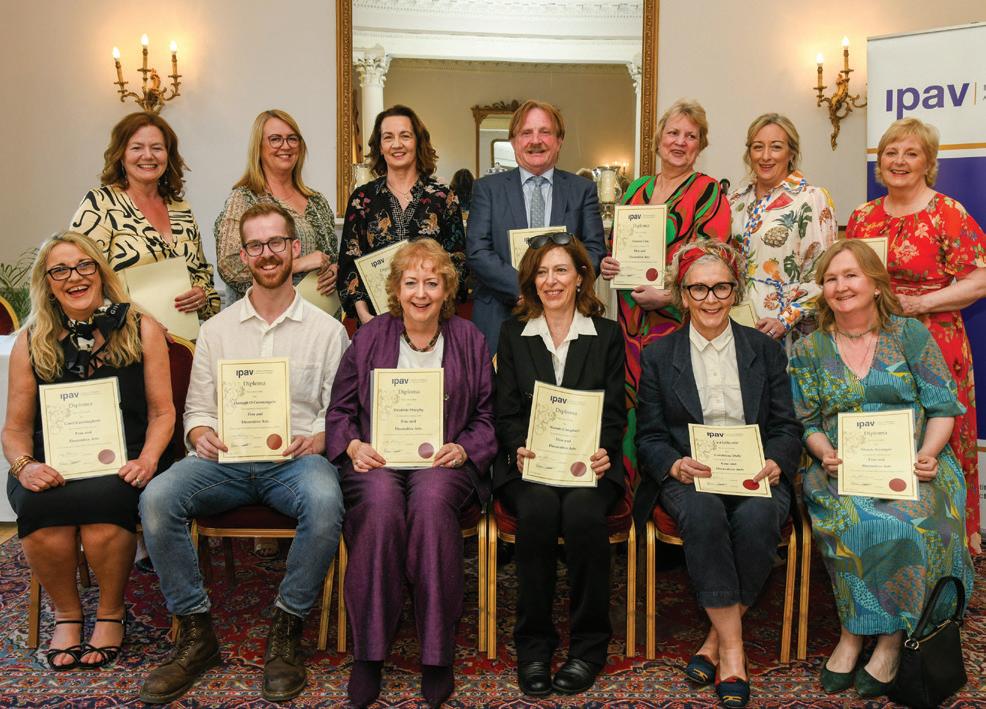

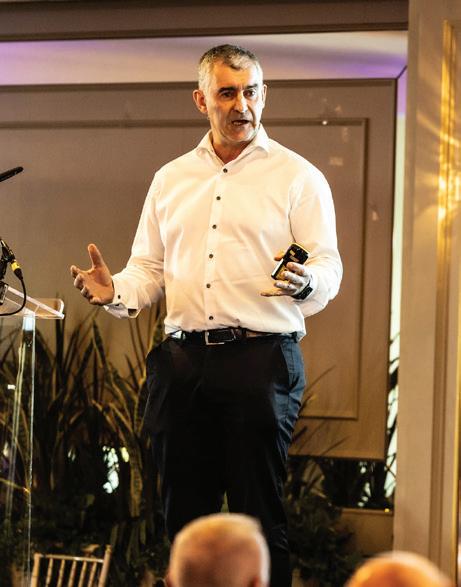

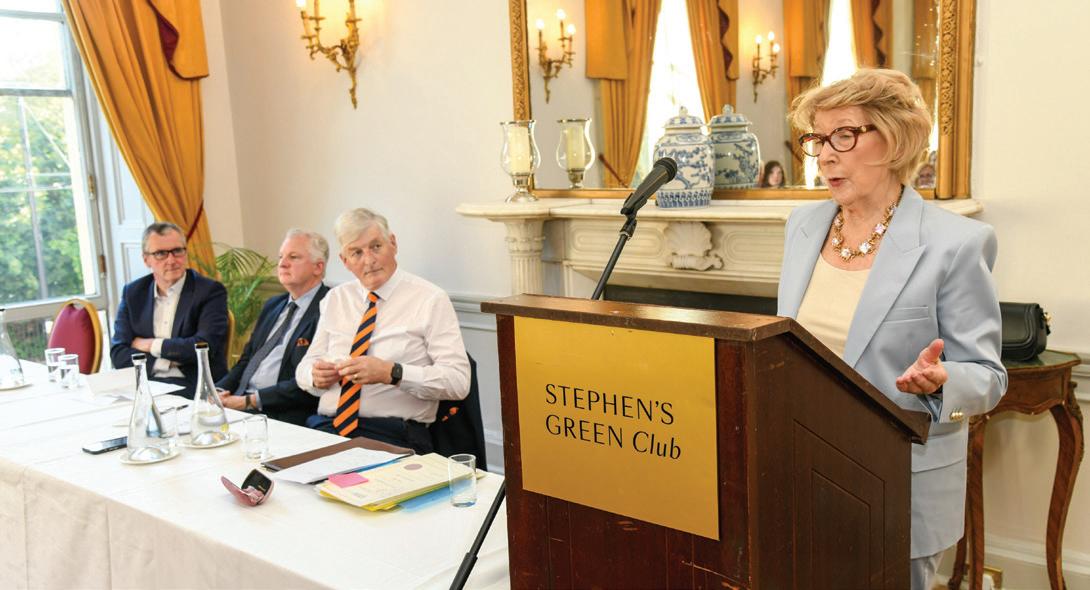
Stephen’s Green Club, Dublin 2 10th May 2024
Congratulations to the classes of 2024! Students, following a year of study of the fine & ancillary arts, graduated with a Diploma in Fine & Decorative Arts. New and returning students, following a study of Art in France, graduated with a Certificate. We wish all graduates the very best for their future, and special thanks to Roxane Moorhead, Course Director for developing and overseeing yet another exceptional Fine & Decoratives Arts Programme. Further information info@ipav.ie
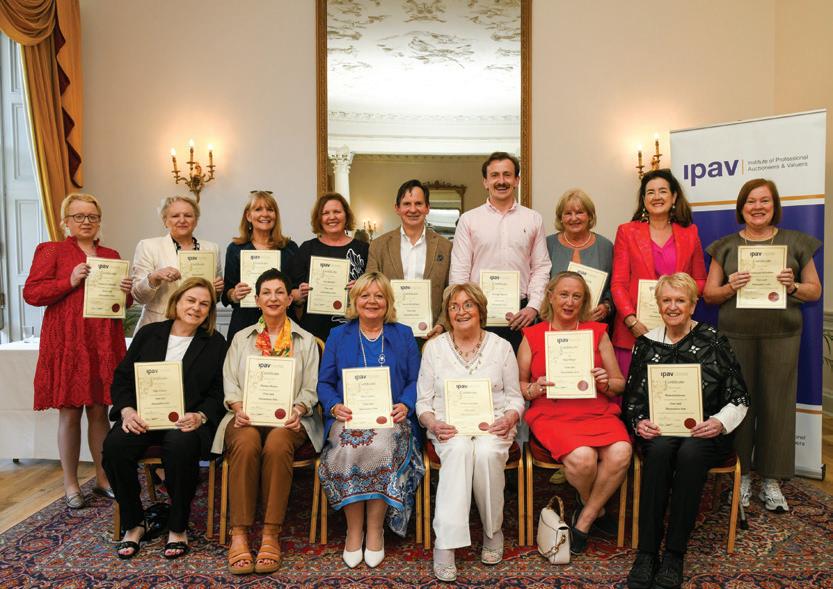
Each quarter, we ask our members a question and get the inside scoop on your thoughts and opinions on a hot topic. For this issue, we focused on the contentious subject of AI (Artificial Intelligence). We wanted to know how many of you are using it, and how many of you think it has value in our industry. Here are the results…
14% NOT AT ALL FAMILIAR
If you don’t currently use AI, why not? WHAT YOU SAID…
“So far no need. Don’t recognize any benefits and suspicious it could be manipulative.”
Kevin Fox Property Consultant
“Whilst AI is a formidable tool in agency it has the propensity to be inaccurate and lacks empathy and feeling. It also presents a very real issue with removing the very real need for human interaction.”
Stephen McCarron, Donnybrook Estate Agents
“Because I don’t know enough about it.”
Declan Woulfe, DNG Declan Woulfe
“I guess I’m an old dinosaur. Don’t really understand how it works and how it could help me with my business.”
Anonymous
“I know nothing about the benefits of having AI.”
Brian Nestor Auctioneers
“Still like to use my own creative side and maybe just haven’t looked into how much it can help reduce workload.”
Anonymous
Would you be interested in learning more about AI?
Do you currently use AI in your work? If so, how?
“I use it to research areas that I am going to be advertising in, [or for] information on amenities there. Also, for researching what is being put out about the market, property and the economy. As like google, people believe its content, fact or fiction. Therefore, [we] need to be mindful of this.”
Declan Davis, Property Home and Away ltd.
“At times I use AI for inspiration when writing descriptive paragraphs of properties in brochures.”
Nessa O’Farrell, RE/MAX Property Experts Carlow
“I use it to generate content for blog posts or marketing material. It is excellent to give you a framework, especially if you have writers block! I always edit anything AI produces because the language is usually quite flowery. It is a great tool as long as you don’t rely solely on it, take the time to put it into your own voice and always fact check!”
Sarah Cronin, Cronin Falvey Properties
“Editing photos to add blue skies. It works very well.”
Niall Fleeton, Independent Valuations
We have the tools, knowledge & expertise to make your property business a success.

Websites designed to engage Vendors & Landlord.
The most cost e ective online bidding system on the Irish Market.
Manage and nurture your leads. Be alerted when long term leads become active. Streamline processes with auto-marketing.
Ireland No1 Property CRM. Manage Property Sales & Lettings easily.
Facebook and Google Ad campaigns including Remarketing. Target the Vendors & Landlords that have been on your site recently.




























